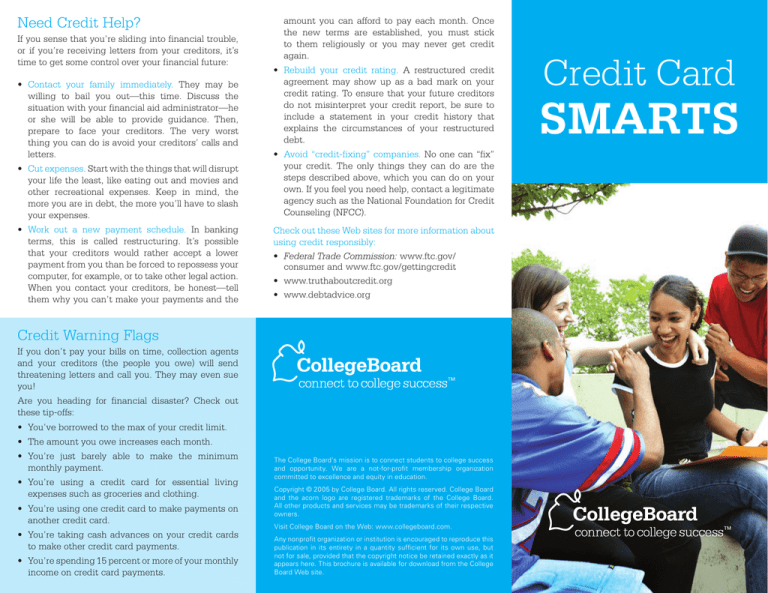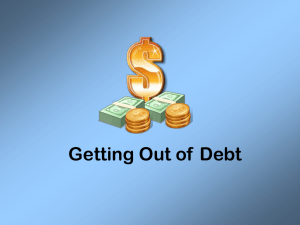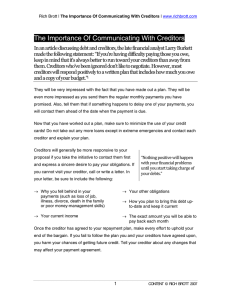
Need Credit Help?
If you sense that you’re sliding into financial trouble,
or if you’re receiving letters from your creditors, it’s
time to get some control over your financial future:
• Contact your family immediately. They may be
willing to bail you out—this time. Discuss the
situation with your financial aid administrator—he
or she will be able to provide guidance. Then,
prepare to face your creditors. The very worst
thing you can do is avoid your creditors’ calls and
letters.
• Cut expenses. Start with the things that will disrupt
your life the least, like eating out and movies and
other recreational expenses. Keep in mind, the
more you are in debt, the more you’ll have to slash
your expenses.
• Work out a new payment schedule. In banking
terms, this is called restructuring. It’s possible
that your creditors would rather accept a lower
payment from you than be forced to repossess your
computer, for example, or to take other legal action.
When you contact your creditors, be honest—tell
them why you can’t make your payments and the
amount you can afford to pay each month. Once
the new terms are established, you must stick
to them religiously or you may never get credit
again.
• Rebuild your credit rating. A restructured credit
agreement may show up as a bad mark on your
credit rating. To ensure that your future creditors
do not misinterpret your credit report, be sure to
include a statement in your credit history that
explains the circumstances of your restructured
debt.
• Avoid “credit-fixing” companies. No one can “fix”
your credit. The only things they can do are the
steps described above, which you can do on your
own. If you feel you need help, contact a legitimate
agency such as the National Foundation for Credit
Counseling (NFCC).
Check out these Web sites for more information about
using credit responsibly:
• Federal Trade Commission: www.ftc.gov/
consumer and www.ftc.gov/gettingcredit
• www.truthaboutcredit.org
• www.debtadvice.org
Credit Warning Flags
If you don’t pay your bills on time, collection agents
and your creditors (the people you owe) will send
threatening letters and call you. They may even sue
you!
Are you heading for financial disaster? Check out
these tip-offs:
• You’ve borrowed to the max of your credit limit.
• The amount you owe increases each month.
• You’re just barely able to make the minimum
monthly payment.
• You’re using a credit card for essential living
expenses such as groceries and clothing.
• You’re using one credit card to make payments on
another credit card.
• You’re taking cash advances on your credit cards
to make other credit card payments.
• You’re spending 15 percent or more of your monthly
income on credit card payments.
The College Board’s mission is to connect students to college success
and opportunity. We are a not-for-profit membership organization
committed to excellence and equity in education.
Copyright © 2005 by College Board. All rights reserved. College Board
and the acorn logo are registered trademarks of the College Board.
All other products and services may be trademarks of their respective
owners.
Visit College Board on the Web: www.collegeboard.com.
Any nonprofit organization or institution is encouraged to reproduce this
publication in its entirety in a quantity sufficient for its own use, but
not for sale, provided that the copyright notice be retained exactly as it
appears here. This brochure is available for download from the College
Board Web site.
Credit Card
SMARTS
There are many reasons you might get a
credit card: convenience, a good credit
rating for the future, use in emergencies,
extras like airplane miles and purchase
protection, or a free T-shirt!
While credit cards are not bad on their
own, they can be your fast track to financial
trouble. Read on to learn what you need to
know to make smart credit card decisions
and avoid the credit trap. ➤
What to Look For in a Credit Card
the rate go up if you make a late payment? What if
you miss a payment to another company?
There are a few major things you should look for when
shopping for the best credit card. Think your decision
through carefully and always read and understand the
fine print, especially if it’s next to an asterisk!
• Is the rate offered based on your specific credit
rating or will the company compute your actual rate
once you apply?
Fees
• Is there an annual fee?
• Will you be charged a late fee? How many days are
considered “late”?
• Is there a fee for charging more than your credit
limit?
• Is there a cash advance fee? (Beware: The cash
advance is a HUGE credit trap!) Is there a different
interest rate and/or a grace period for a cash
advance?
Grace Period
• How long do you have to pay off a charge before the
company charges interest on it?
• Will you have a grace period if you carry a balance
from month to month?
• Do you understand how the grace period works?
Interest Rate
Here’s where most companies sell you on their card.
The interest rate is what the company will charge you
on your unpaid balance. They often promise a low
introductory rate like 2 percent that seems incredible.
Just remember that these companies have to make
money on you to stay in business, so that rate will not
last forever or come without strings attached. Often it
will jump to 18 percent or higher! Ask the following
questions:
• How long does the introductory rate last? What is
the interest rate after the introductory period?
• Is the interest rate variable or fixed? Will the rate
fluctuate according to the financial market or will it
stay the same regardless of the market?
• On what conditions is the interest rate based? Will
Avoid the Credit Trap
Once you obtain a credit card, be careful not to get
in over your head in credit card debt! Excessive
debt could cause you to have to work while you’re
in school to make ends meet, or even to drop out.
Negative marks on your credit report can prevent
you from getting a job, your first apartment, a car, or
a loan for graduate school! Negative items on your
credit report remain there for seven years and can
seriously affect your opportunities after you graduate
from college. And if your credit debt causes you to
default on a student loan, it will stay on your record
forever.
Follow these principles to help you stay on top of your
credit cards:
• Ask yourself how you’ll pay the bill. Are you
expecting income from a job or some other source
or are you just figuring that you’ll deal with it when
the bill comes?
• Don’t buy things you can’t afford. A credit card is
not an extra $1,000 someone has handed you. It’s
$1,000—or whatever your maximum is—that will
be paid with your money. Even if it seems like a
great deal at the time, that $50 purchase can end
up costing a lot more if it sits on your credit card
and accrues interest.
• Limit yourself to one card with a low spending
limit. If you have just one card with a low limit, it
will be easier to avoid overspending.
• Avoid impulse buys! Often the things we buy
with credit are not planned purchases. We see
something and we just have to have it. Try leaving
your credit card at home when you go shopping.
That way, you’ll spend only the money you have,
not the money you wish you had. If you’re still
dying for that item the next day, go back to the
store and get it. Chances are, you won’t be and you
will have saved yourself some money.
• Pay your balance each month. There’s nothing
wrong with having the convenience of a credit card
if you can pay the balance each month. However,
if you can’t, that means you’re spending money
you don’t have. The credit card company charges
significant amounts of money to hold that balance
for you. If you can’t pay the entire bill, at least pay
more than just the minimum. If you only pay the
minimum, the balance will run up hefty amounts in
interest and take years to pay off!
• Pay your credit card bills on time. Paying on time
means that you avoid late fees, and that you won’t
have negative items on your credit report for
missing your due dates.
• Consider using a debit card instead of a credit
card. A debit card acts the same as a credit
card, but the money comes directly out of your
checking account. With a debit card, you have
the convenience of a credit card, but you can only
spend money you actually have in the bank.




